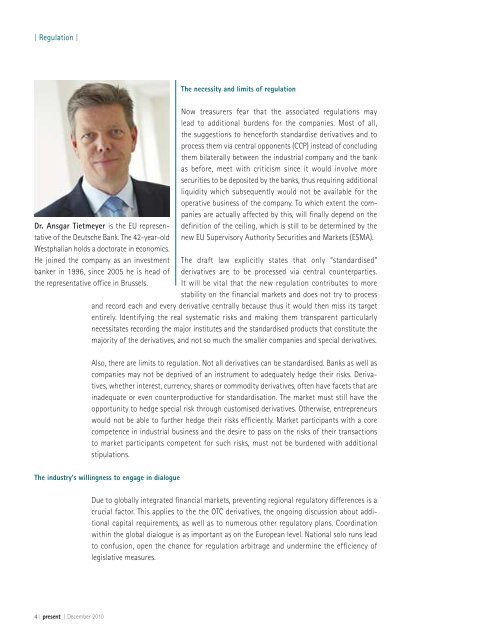Contributions by Ulrike Ackermann Inga Büscher-Arft Manfred Kurz ...
Contributions by Ulrike Ackermann Inga Büscher-Arft Manfred Kurz ...
Contributions by Ulrike Ackermann Inga Büscher-Arft Manfred Kurz ...
You also want an ePaper? Increase the reach of your titles
YUMPU automatically turns print PDFs into web optimized ePapers that Google loves.
| Regulation |<br />
Dr. Ansgar Tietmeyer is the EU representative<br />
of the Deutsche Bank. The 42-year-old<br />
Westphalian holds a doctorate in economics.<br />
He joined the company as an investment<br />
banker in 1996, since 2005 he is head of<br />
the representative office in Brussels.<br />
The necessity and limits of regulation<br />
Now treasurers fear that the associated regulations may<br />
lead to additional burdens for the companies. Most of all,<br />
the suggestions to henceforth standardise derivatives and to<br />
process them via central opponents (CCP) instead of concluding<br />
them bilaterally between the industrial company and the bank<br />
as before, meet with criticism since it would involve more<br />
securities to be deposited <strong>by</strong> the banks, thus requiring additional<br />
liquidity which subsequently would not be available for the<br />
operative business of the company. To which extent the companies<br />
are actually affected <strong>by</strong> this, will finally depend on the<br />
definition of the ceiling, which is still to be determined <strong>by</strong> the<br />
new EU Supervisory Authority Securities and Markets (ESMA).<br />
The draft law explicitly states that only “standardised”<br />
derivatives are to be processed via central counterparties.<br />
It will be vital that the new regulation contributes to more<br />
stability on the financial markets and does not try to process<br />
and record each and every derivative centrally because thus it would then miss its target<br />
entirely. Identifying the real systematic risks and making them transparent particularly<br />
necessitates recording the major institutes and the standardised products that constitute the<br />
majority of the derivatives, and not so much the smaller companies and special derivatives.<br />
Also, there are limits to regulation. Not all derivatives can be standardised. Banks as well as<br />
companies may not be deprived of an instrument to adequately hedge their risks. Derivatives,<br />
whether interest, currency, shares or commodity derivatives, often have facets that are<br />
inadequate or even counterproductive for standardisation. The market must still have the<br />
opportunity to hedge special risk through customised derivatives. Otherwise, entrepreneurs<br />
would not be able to further hedge their risks efficiently. Market participants with a core<br />
competence in industrial business and the desire to pass on the risks of their transactions<br />
to market participants competent for such risks, must not be burdened with additional<br />
stipulations.<br />
The industry's willingness to engage in dialogue<br />
4 | present | December 2010<br />
Due to globally integrated financial markets, preventing regional regulatory differences is a<br />
crucial factor. This applies to the the OTC derivatives, the ongoing discussion about additional<br />
capital requirements, as well as to numerous other regulatory plans. Coordination<br />
within the global dialogue is as important as on the European level. National solo runs lead<br />
to confusion, open the chance for regulation arbitrage and undermine the efficiency of<br />
legislative measures.<br />
Private industry lastingly supports the numerous regulatory plans in general and OTC<br />
regulation in particular. However, an appropriate evaluation of the effects those measures<br />
bring about has to be made in the long run, because if not applied with moderation,<br />
regulation will become counterproductive. To avoid such a scenario, the active dialogue<br />
between politics, regulators, and companies is necessary. The industry is ready for that.<br />
| Regulation |<br />
December 2010 | present | 5












